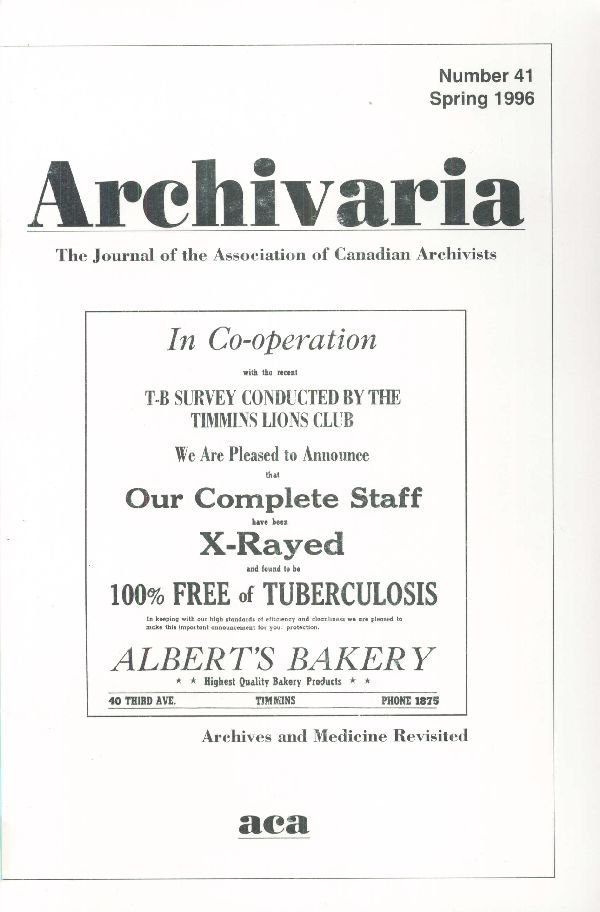Scholarly Returns: Patterns of Research in a Medical Archives
Résumé
To learn more about researchers who utilize archival documentation from the health fields and the works that they produce, we conducted a study of patrons of the Alan Mason Chesney Medical Archives of The Johns Hopkins Medical Institutions from the inception of the programme in 1978 through 1994. User Population-- Records for both on-site and remote reference services show that fifty-five per cent of the user population was affiliated with Johns Hopkins and that most of the individuals in the remaining forty-five per cent of the population had affiliations to similar institutions--health care delivery facilities and research universities. The overall user population included both students and professionals from a broad range of disciplines within the health sciences, humanities, and social sciences. Works Produced--Our focus was on works in print (theses, dissertations, articles, chapters, and books). We classified works according to four common topics of research: individuals and their influences; professions in the health, life, and biological sciences; institutions in the health fields; and key functions of institutions in the health fields. Guided by a list of 789 users who had indicated an intention to publish, we located citations to 260 publications. From this group we selected a sample of 136 citations for discussion. Significance of Findings--The bibliographic sample provides insight into common topics of research at a health sciences archives. We hope that elucidation of intellectual themes will serve as a useful resource for appraisal, processing, and reference services. Implications for the Future--That a preponderance of users had affiliations with not-for-profit institutions and published with not-for-profit presses raises compelling issues for the future of archival services. As the funding base for not-for-profit organizations is shrinking, there are fewer resources for travel, research, and academic publishing. To accommodate an audience with less time for research and fewer options for travel, archival programmes will be pressed to develop a wider range of services for remote access. Moreover, as electronic access to literature of the health sciences expands, there are enhanced expectations for electronic access to archival documentation. Archival programmes must, therefore, be poised to assume a more dynamic role in electronic communication. Whereas Internet access to archives will serve largely as a convenience for traditional users, it also promises to introduce archives to a wide new audience of users.
RÉSUMÉ
Afin de mieux connaître les chercheurs qui utilisent la documentation archivistique reliée au domaine de la santé ainsi que leurs travaux, nous avons dirigé une étude de la clientèle du Alan Mason Chesney Medical Archives du Johns Hopkins Medical Institutions du début du programme en 1978 jusqu'en 1994. Les usagers: Les dossiers des services de référence, à la fois sur place et à distance, démontrent que cinquante-cinq pour cent des usagers étaient affiliés à Johns Hopkins et que la majorité des autres quarante-cinq pour cent était affiliée à des institutions similaires (distribution de soins de santé et recherches universitaires). L'ensemble des usagers comprend à la fois des étudiants et des professionnels provenant d'un large éventail de disciplines connexes aux sciences de la santé, aux humanités, ainsi qu'aux sciences sociales. Travaux réalisés: Notre étude vise les travaux publiés (thèses, mémoires, articles, chapitres, et livres). Nous avons regroupé les travaux selon quatre types de recherche: les individus et leur influence, les professions dans le domaine de la santé, de la vie et de la biologie; les institutions reliées au domaine de la santé ainsi que leurs principales fonctions. Guidés par une liste de 789 clients qui ont indiqué leur intention de publier, nous avons repéré des citations dans 260 publications. De ce groupe, nous avons découpé un échantillon de 136 citations pour fins de discussion. Signification des résultats: L'échantillon bibliographique révèle les sujets de recherche communs dans un centre d'archives en sciences de la santé. Nous souhaitons que l'élucidation de ces thèmes de recherche intellectuelle s'avère utile pour l'évaluation, le traitement, et les services de référence. L'avenir: Qu'une majorité de clients soit affiliée à des institutions sans buts lucratifs et publie dans des revues également sans buts lucratifs soulève d'irrésistibles questions concernant l'avenir des services archivistiques. Comme les ressources des institutions sans buts lucratifs vont en diminuant il y a moins de ressources disponibles pour assumer les frais de voyage, la recherche et les publications académiques. Afin d'accommoder une clientèle qui dispose de moins en moins de temps pour la recherche et moins de possibilité de voyager, les programmes archivistiques seront contraints de développer une gamme plus vaste de services pour l'accès à distance. De plus, comme l'accès électronique à la littérature des sciences de la santé va en s'accroissant, il y a une augmentation des attentes concernant l'accès électronique à la documentation archivistique. Les programmes archivistiques doivent donc être prêts à jouer un rôle plus dynamique dans le domaine de la communication électronique. L'accès aux centres d'archives via Internet servira à la fois les usagers traditionnels et permettra de rendre les archives accessibles à une large et nouvelle catégorie d'usagers.
Authors of manuscripts accepted for publication retain copyright in their work. They are required to sign the Agreement on Authors' Rights and Responsibilities that permits Archivaria to publish and disseminate the work in print and electronically. In the same agreement, authors are required to confirm that "the material submitted for publication in Archivaria, both in its paper and electronic versions, including reproductions of other works (e.g. photographs, maps, etc.) does not infringe upon any existing copyright." Authors of manuscripts accepted for publication retain copyright in their work and are able to publish their articles in institutional repositories or elsewhere as long as the piece is posted after its original appearance on archivaria.ca. Any reproduction within one year following the date of this agreement requires the permission of the General Editor.





